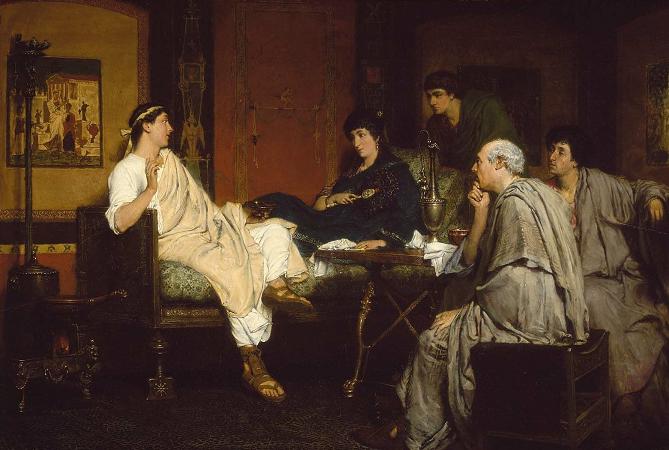Tibullus (c-55 - -19). Albius Tibullus was a Latin poet and writer of elegies. His first and second books of poetry are extant; many other texts attributed to him are of questionable origins. Little is known about the life of Tibullus. There are only a few references to him by later writers and a short Life of doubtful authority. Neither his praenomen nor his birthplace is known, and his gentile name has been questioned. His status was probably that of a Roman eques, and he had inherited a considerable estate. Like Virgil, Horace and Propertius, he seems to have lost most of it in 41 BC in the confiscations of Mark Antony and Octavian. Scholar Francis Cairns regards Tibullus as a good poet but not a great one; Dorothea Wender similarly calls him a minor poet but argues there is grace and polish and symmetry to his work. Tibullus's chief friend and patron was Marcus Valerius Messalla Corvinus, himself an orator and poet as well as a statesman and a commander. Messalla, like Gaius Maecenas, was at the centre of a literary circle in Rome. This circle had no relationship with the court, and the name of Augustus is found nowhere in the writings of Tibullus. About 30 BC Messalla was dispatched by Augustus to Gaul to quell a rising in Aquitania and restore order in the country, and Tibullus may have been in his retinue. On a later occasion, probably in 28, he would have accompanied his friend who had been sent on a mission to the East, but he fell sick and had to stay behind in Corcyra. Tibullus had no liking for war, and though his life seems to have been divided between Rome and his country estate, his own preferences were wholly for the country life. The loss of Tibullus's landed property is attested by himself, as a farmer felicis quondam, nunc pauperis agri. Its cause is only an inference, though a very probable one. That he was allowed to retain a portion of his estate with the family mansion is clear from ii.4, 53. Tibullus may have been Messalla's contubernalis in the Aquitanian War, and may have received dona militaria. Tibullus died prematurely, probably in 19, and almost immediately after Virgil. His death made a deep impression in Rome, as is clear from his contemporary, Domitius Marsus, and from the elegy in which Ovid enshrined the memory of his predecessor. Tibullus's first book consists of poems written at various times between 30 and 26. His first love, the subject of book i., is called Delia in the poems, but Apuleius reveals that her real name was Plania. As regards her station, it should be noticed that she was not entitled to wear the stola, the dress of Roman matrons. Her husband is mentioned as absent. She eludes the custodes placed over her. Tibullus's suit was favoured by Delia's mother, of whom he speaks in very affectionate terms. For Tibullus's illness at Corcyra, see i. 3, I seq., 55 seq. The fifth elegy was written during estrangement, and the sixth after the return of the husband and during Delia's double infidelity. It is impossible to give an exact account of the intimacy. The poems which refer to her are arranged in no chronological order. Sometimes she appears as single, sometimes as married; but we hear nothing either of her marriage or of her husband's death. Yet it is clear that it was the absence of her husband on military service in Cilicia which gave Tibullus the opportunity to see her, and he continued to do so when the husband returned. Delia was clever in deception, too clever, as Tibullus saw when he found that he was not the only lover. His entreaties and appeals were of no avail; and after the first book no more is heard of Delia. In addition, several elegies in Book I concern themselves with Tibullus's love for a boy, who is named Marathus. The three poems centered on Marathus constitute the longest poetic project in Roman literature having homosexual love as theme. The first of these poems, 1.4, begins with an imprecation of the poet to the god Priapus, asking for advice on how to win over beautiful boys. The god advises patience and that the man in love yield to the beloved boy's every whim and perform a series of services if the boy demands it. At first the narrator of the poem presents himself as someone who is simply asking for advice from the god on behalf of a friend who fell in love with a boy but whose wife forbids such affairs. He later portrays himself as a teacher in the affairs of love, declaring that the doors of his house are open for other men in love with boys to ask his advice. In the end lines, however, he confesses to loving a boy named Marathus, who tortures him with love's delay and whom the narrator can not conquer with his arts, causing other men to laugh at his lessons.
more...



